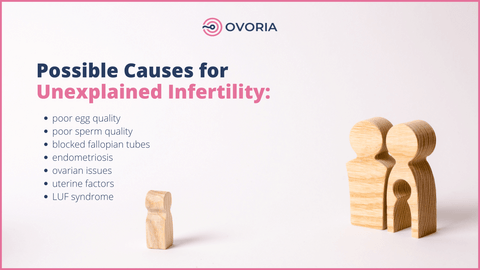Possible Causes of Unexplained Infertility
Sometimes it's not possible to identify the cause of an infertility problem. This can happen in all areas of medicine, and it's frustrating and hard for future patients on the getting end of this fertility diagnosis.

What is Unexplained Infertility?
Unexplained infertility is the most common type of infertility women could face. It's responsible for around 30% of infertility cases. Even after primary infertility medical tests are carried out, the source of infertility remains a secret.

Possible Causes for Unexplained Infertility
There is a list of possible reasons that can lead to unexplained infertility:
- Poor egg quality: There are few tests to determine if a woman is ovulating, and testing to get a general idea of whether there is a relatively good quantity of eggs in the ovaries. But because there is no test to determine whether the eggs are of good quality.
- Poor sperm quality: Some kinds of poor sperm quality are recognizable. For example, poor sperm shape (also known as morphology) may cause fertility problems. Poor motility may also cause infertility. These are diagnosable. They can be seen during a semen analysis.
- Blocked fallopian tubes: It is a common cause of female infertility. A woman’s fallopian tubes may become blocked from endometriosis, prior pelvic surgery or infection, or unexplained reasons. A hysterosalpingogram, or HSG, is commonly used to screen for tubal abnormalities. If abnormalities are detected on the HSG or if the findings are inconclusive, surgery may be used to definitively diagnose and sometimes treat tubal disease. If blocked tubes are the only abnormality discovered during an infertility investigation, then the couple has a very good prognosis for pregnancy with IVF.
- Endometriosis: it is a painful disease when tissue similar to the tissue that normally lines the inside of a woman's uterus — the endometrium, which grows outside the uterus. Generally, endometriosis involves ovaries, fallopian tubes and the tissue lining pelvis.
- Ovarian issues: Infertility can be caused by conditions that involve and impact the ovaries, like polycystic ovary syndrome (PCOS)
- Uterine factors: Throughout a woman’s life, there are a number of things that may happen that can permanently change/damage her female organs/hormones, or may require removal of the uterus, thereby leading to infertility.
- LUF syndrome: Also known as 'Luteinized Unruptured Follicle' syndrome;
- Luteal phase abnormalities;
- Psychological aspects;
- Immunological causes;
- Infections.
Can I Get Pregnant With Unexplained Infertility?
Yes! There is good news unexplained infertility doesn’t mean that future patients don’t have chances of conceiving, but of course, their chances are lower without medical assistance. According to statistics, there is a 2-4% chance of conceiving per cycle if a couple were diagnosed with infertility, but to increase chances of getting pregnant, the fertility specialist will recommend few infertility treatment options.
The American Society for Reproductive Medicine (ASRM) recommend few fertility treatments for infertile couples who got diagnosed with unexplained infertility:
In vitro fertilization (IVF): ) is a method of artificial insemination for treating unexplained infertility. The sperm, which have been washed and concentrated, are carefully placed inside the uterus when the ovary releases one or more eggs for fertilization. The desired result of intrauterine insemination (IUI) is for sperm to reach the fallopian tubes and fertilize a waiting egg. According to reasons for infertility, IUI can be coordinated with a normal cycle or with fertility medications.
Intrauterine insemination (IUI): is the most effective form of assisted reproductive technology. It is a complex series of procedures used to help with fertility or prevent genetic problems and assist with the conception of a child. The process of having an IVF cycle consists of getting mature eggs from the ovaries, fertilizing them with sperm in a lab, transferring the embryo to a uterus, and finally waiting for a time period. Intrauterine insemination alone or with fertility drugs will definitely, but slightly increase the odds of pregnancy.
Of course, there are other treatment options for couple's infertility:
- Laparoscopic surgery (keyhole surgery): Some doctors are thinking that unexplained infertility may be caused by mild endometriosis. In the case of mild endometriosis, the endometrial deposits may not be causing pain or directly interfering with ovulation or the fallopian tubes, but their presence may increase “irritation” of the reproductive system.
- Gamete Donation: If your fertility is affected by egg, sperm, or embryo quality problems, you may choose to use a gamete or embryo donor. Egg donation is the most expensive option followed by embryo donation.
- Reproductive Immunological Treatments: Reproductive immunology is a field of medicine concerned with the interactions between the immune system and the reproductive system, focusing on recurrent pregnancy loss or repeated IVF failures.
- Surrogacy: It is an agreement when a woman carries and delivers a baby for another person or couple. The woman who carries the baby is the gestational surrogate or gestational carrier. The parents are known as the intended parents, and they are involved in the pregnancy, and after the baby’s birth, they become the child’s parents.
References:

